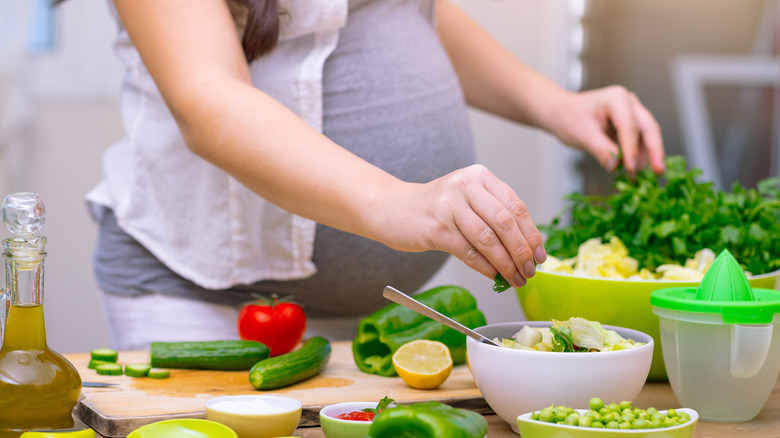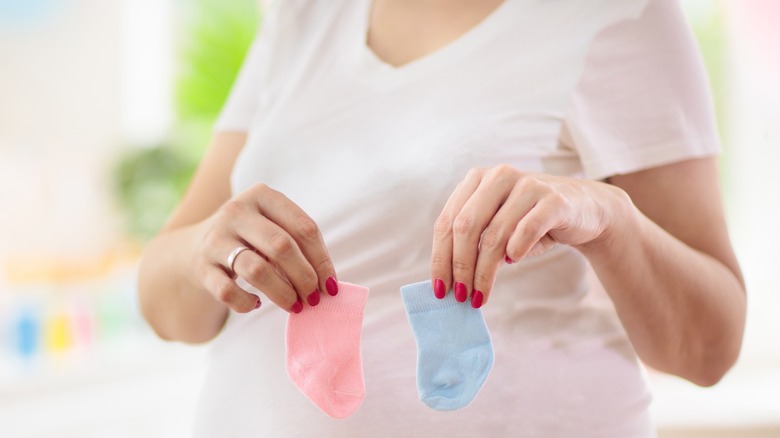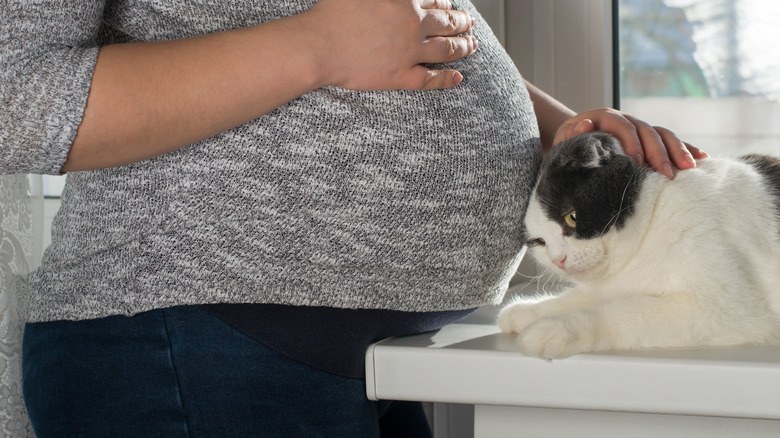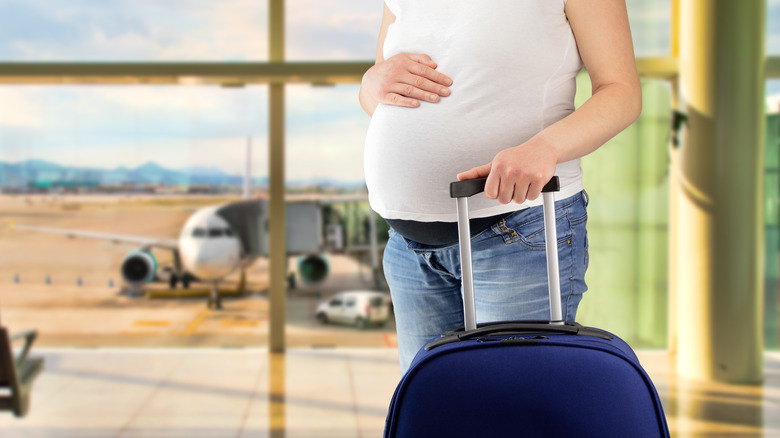Myths About Pregnancy That Have Already Been Busted
So you're having a baby. Congratulations! Now, what do you do? Pregnancy should be a joyful time, but with so many opinions about the dos and don'ts, it can be hard to navigate the journey without feeling confused and overwhelmed. It may be tempting to google every pregnancy-related question, but the best thing you can do is seek medical advice and approach this time with a glass-half-full mindset. "A woman with a positive attitude can focus on eating well, sleeping enough, and staying active. She is also able to focus on the miraculous changes within her body and the developing relationship with her unborn infant," Dr. Irene E. Aga, assistant professor of obstetrics and gynecology at the University of Texas Health Science Center at Houston, told Parents.
Although stress is inevitable, enjoying your pregnancy is all about the tools you use to manage negative emotions. "Exercise, prayer, and meditation are all helpful. I also encourage women to discuss their concerns with their partners, families, and doctors and to seek the support they need," advises Dr. Aga. It's also essential to follow the right advice and not believe everything you hear about pregnancy. So before you give up your morning coffee and cancel your holiday plans, we've compiled an expert-based guide to the common pregnancy myths that have been busted.
Myth 1: You need to eat for two
Two rounds of dessert? Yes, please! For most pregnant women, eating for two sounds like an excellent perk of pregnancy. Unfortunately, the idea that your body needs double the servings during pregnancy is an old myth and can be unhealthy. "Many women who do 'eat for two' end up gaining an excessive amount of weight," says Julie Redfern, a registered dietitian at Brigham and Women's Hospital in Boston (via WebMD).
According to the ACOG, you don't require extra calories in the first trimester and can add 340 calories per day in the second trimester to your diet and about 450 extra calories a day in the third trimester. To get the extra calories, you might want to skip the cheeseburger order because the extra calories gained should add nutritional value to your diet. So, when hunger strikes, it's a good idea to avoid sweets and candy; your postpartum self will thank you for this. Instead, reach out for healthy snacks like hardboiled eggs, fruit, oatmeal, and yogurt, per CDC.
Myth 2: You shouldn't exercise while pregnant
If you thought being pregnant meant you could cancel your gym membership and binge-watch your favorite show ("Emily in Paris," anyone?), you should think twice. Don't worry; you can still watch television and enjoy your downtime, but staying active while pregnant is essential for your overall well-being. If you have an uncomplicated pregnancy, exercise is a great way to keep in shape and a great mood booster, and with all your hormones changing, the extra endorphins will be well-received. But, of course, it's essential to consult your doctor before trying a new exercise routine because not all physical activity is safe during pregnancy, per CDC.
On the flip side, if you consider yourself a gym junkie, the good news is that according to the ACOG, "physical activity and exercise in pregnancy are associated with minimal risks and have been shown to benefit most women." Some physical activities considered safe during pregnancy include walking, stationary cycling, dancing, stretching, and water aerobics.
To get the benefits of exercise without the risks, always consult your doctor if something doesn't feel right, avoid high-temperature activities like hot yoga, and don't engage in high-risk sports like scuba diving, horseback riding, and skiing, per the ACOG.
Myth 3: It's safe to have a bit of alcohol while pregnant
A glass of wine during dinner might have been considered safe during pregnancy for past generations. You may even know someone who still thinks having an alcoholic beverage while pregnant every once in a while is entirely okay. But according to the latest research, any amount of alcohol during pregnancy is regarded as a big no-no. "The problem with drinking alcohol during your pregnancy is that there is no amount that has been proven to be safe," says Dr. Jacques Moritz, director of gynecology at St. Luke's-Roosevelt Hospital in New York (via WebMD).
There is solid evidence that high amounts of alcohol have been linked to congenital disabilities, but research on how small amounts of alcohol impact a fetus is limited. So, with so many unknowns regarding the effects of low levels of alcohol, experts say it's best not to drink at all. "The way I see it is: If you wouldn't give a 2-month-old a glass of wine, then why would you drink a glass of wine when you're pregnant?" says Dr. David Garry, associate professor of clinical obstetrics and gynecology at the Albert Einstein College of Medicine and chair of the Fetal Alcohol Spectrum Disorders Task Force for the American College of Obstetricians and Gynecologists District in New York. In addition, the CDC says that "all types of alcohol are equally harmful, including all wines and beer."
Myth 4: You can tell if it's a boy or a girl without medical tests
We all know someone who thinks they have the psychic ability to predict baby genders. Whether looking at your belly shape or using your conception date to work out whether you're having a boy or a girl, these gender prediction methods have been passed down from generation to generation. Although the different ways of supposedly finding out a baby's gender are fun, the inaccuracy of these methods can sometimes be a problem. Eileen Beard, the senior practice advisor for the American College of Nurse-Midwives, cautions new parents to avoid treating gender prediction myths as truth. "Please make sure you know the source of what you're paying attention to or sharing," says Beard, per WebMD.
Although there is no scientific evidence backing non-medical gender predictions, there is always a 50 percent chance of them coming true, and this is perhaps why they are so popular. But if you are looking for a more reliable answer about your baby's gender, your best bet is to rely on an ultrasound test, usually done between weeks 18-20 of pregnancy. These are around 80% to 90% accurate (via WebMD). You could also consult your doctor about other non-invasive tests with a high gender accuracy prediction rate.
Myth 5: You will have the same type of pregnancy every time
There is no humbling feeling for women having their second or third child than realizing you are not a pregnancy expert because not all pregnancies are identical. "Every woman is different, as is each pregnancy different," says Dr. Kecia Gaither, a double-board certified physician in ob-gyn and fetal maternal medicine (Women's Health). In addition, those embarking on motherhood for the second or third time commonly experience a more uncomfortable pregnancy.
"There are a multitude of reasons that subsequent pregnancies might feel more difficult," Dr. Danielle Jones, an ob-gyn, told Verywell Family. According to Jones, factors such as a woman's age, health, and lifestyle all impact how you will feel during pregnancy. Also, having small children running around while pregnant adds challenges and many experienced moms often forget to look after themselves, which doesn't help with exhaustion. "Women in their second pregnancies often forget to take the supplements that are recommended," says Nicola Strydom, a registered midwife (via Today's Parent).On the bright side, according to Healthline, women going through their second pregnancy are usually likely to experience shorter labor because the body has been through it all before. Now that's a win.
Myth 6: You can't drink coffee while pregnant
Coffee lovers rejoice! Small amounts of caffeine, less than 200 mg per day or about a 12-ounce cup of coffee, are not linked to an increased risk of miscarriage or preterm birth (per ACOG). Expectant moms that are coffee drinkers might also like to hear that one 2021 study from the University of Pennsylvania concluded that caffeine during pregnancy could help to reduce gestational diabetes risk. However, researchers cautioned women who are not coffee drinkers not to start drinking coffee for this reason and said the study was just to reassure expectant moms who already drink coffee.
However, as caffeine crosses the placenta, the general advice is to avoid it if you can or at least do your best to limit your intake. It is also essential to consider that caffeine is also present in other food and drinks, such as chocolate and some teas, according to the ACOG. Expectant moms who are worried about caffeine intake can always enjoy a decaf coffee or tea.
Myth 7: Morning sickness only happens in the morning
One of the most misleading terms you hear during pregnancy is "morning sickness" because many expectant moms soon discover that this dreaded illness can strike anytime. "It's called morning sickness because many people experience nausea and vomiting in the morning, however, there are many women who experience these symptoms throughout the day," Dr. Heather Irobunda, an ob-gyn based in Queens, New York, told Cosmopolitan.
According to the American Pregnancy Association, more than half of pregnant women experience morning sickness. It usually begins around the sixth week of pregnancy and ends at around week 12 of your first trimester. However, not all women are impacted by morning sickness, and symptoms differ every pregnancy. "One may have morning sickness with the first pregnancy but not experience anything with subsequent pregnancies," says Dr. Kecia Gaither, a double-board certified physician in ob-gyn and fetal-maternal medicine, per Women's Health.
Dr. Sherry Ross, ob-gyn and women's health expert, says that although there is no cure for morning sickness, there are ways to minimize its impact. "The best way to avoid nausea during pregnancy is to eat frequently and often," says Ross. "Don't wait to feel hungry to eat, and drink cold, clear, and carbonated beverages in small amounts, as often as possible."
Myth 8: Breastfeeding comes naturally
With so many benefits, most expectant moms are eager to breastfeed their babies and think it will be easy to connect with their newborns. However, this is often not the case. Breastfeeding can be a real emotional and physical struggle for new and experienced moms. According to a 2019 study published in the medical journal, Nutrients: "around 70.3% of mothers experienced breastfeeding difficulties, reporting cracked nipples, perception of insufficient amount of milk, pain, and fatigue." The researchers of this study concluded that new moms need professional support in learning to breastfeed correctly before being discharged from the hospital. Lactation consultant Jacki Glover says many moms experience problems relating to "latching" or "not having a deep enough attachment of the baby to the breast" (via Today's Parent).
Different from what we see on television or in the movies, breastfeeding is not always easy. In reality, most of the time, breastfeeding requires patience and resilience as there is more to it than meets the eye and every baby's ability to latch is different. Glover says moms should guide babies through the process to succeed at breastfeeding. "The mother needs to provide stability for the baby's shoulders, spine, and hips with no pressure on the baby's head, and the baby needs to be facing the mother and not having to turn his head to latch on," Glover told Today's Parent.
Myth 9: You can't have a cat while pregnant
Cats are furry, loveable companions and are often considered family members before a newborn makes its way into the world. Unfortunately, many pregnant women are told they should not be around cats and think they must give away their feline. Giving away a beloved pet is a heartbreaking decision for cat lovers. However, this does not have to happen, especially if you have an indoor cat. The main problem that pregnant women risk facing from owning a cat is an infection called toxoplasmosis. Symptoms in pregnant women can be challenging to diagnose and "can include headache, fever, body aches, fatigue, and swollen lymph nodes," per WebMD.
The good news is, according to the ACOG, toxoplasmosis is only found in outdoor cars "who go outdoors and hunt prey, such as mice and other rodents." So, as a general rule, even if you have an outdoor cat, you don't have to give it away if you take precautions like having your partner, friends, or family take on the task of cleaning the litter box every day. So kick your feet up and cuddle your fur baby; in most cases, it will become your child's favorite playmate.
Myth 10: You can't have sex while pregnant
Some couples think having sex with their partner when pregnant is entirely off the table. However, if you are having a healthy pregnancy, experts say you have the light to be intimate during all three trimesters of pregnancy. One 2011 study published in the Canadian Medical Association Journal concluded that women with healthy pregnancies "should feel comfortable engaging in sexual activity as they please."
According to Dr. Sherry A. Ross, a California-based ob-gyn, some couples fear having sex could harm the baby, but this is not the case. "The baby may be bounced around, but know that the baby is safe and insulated," Ross told Insider. Dr. Ross says the secret to having good sex is talking to your partner and finding comfortable sexual positions, "ultimately, you're going to experiment with your partner because it's a bit of a dance," she says. However, If you have a complicated pregnancy, which is often called a "high-risk" pregnancy in medical terms, you should seek medical advice about whether or not you can still have sex.
Myth 11: Creams and serums will prevent stretch marks
One of the annoying effects of pregnancy is having to deal with skin changes like stretch marks. Although stretch marks are a normal part of life, they affect pregnant women more than most. One 2021 study found that 95 percent of pregnant women experience stretch marks, according to Sohag Medical Journal. Although most women try a variety of serums, oils, and shea butter, according to clinical dermatologist Enrizza P. Factor, "there are no creams or oils proven to prevent stretch marks. However, keeping the skin supple may be helpful for reducing the risk in some people," clinical dermatologist, Enrizza P. Factor told Yahoo Life.
According to Factor, your best bet in reducing the impact of stretch marks by hydrating your skin with body moisturizer. If your stretch marks are too visible or bother you, it's best to seek treatment after pregnancy and breastfeeding. According to Dr. Emmanuel Loucas, a board-certified dermatologist, the "goal in treatment should be an improvement, not a 'cure.'"
Myth 12: You shouldn't travel when pregnant
If you are a regular jet setter and thought you had to cancel your travel plans because of your pregnancy, here's the excellent news, you don't! According to the ACOG, "in most cases, pregnant women can travel safely until close to their due dates." But, of course, you should always consult with your ob-gyn before booking a trip, as women with pregnancy complications may be advised against travel.
According to Dr. Pamela Berens, professor of ob-gyn at The University of Texas Health Science Center at Houston, if you plan a trip, it's a good idea to aim to travel in the middle of your pregnancy when you feel your best. Beren also advises being prepared for your trip by having "access to your prenatal records when traveling, just in case," per Travel + Leisure. So if you get the green light from your healthcare professional, enjoy a nice relaxing babymoon; who knows, it might be your last escape before your newborn arrives.












